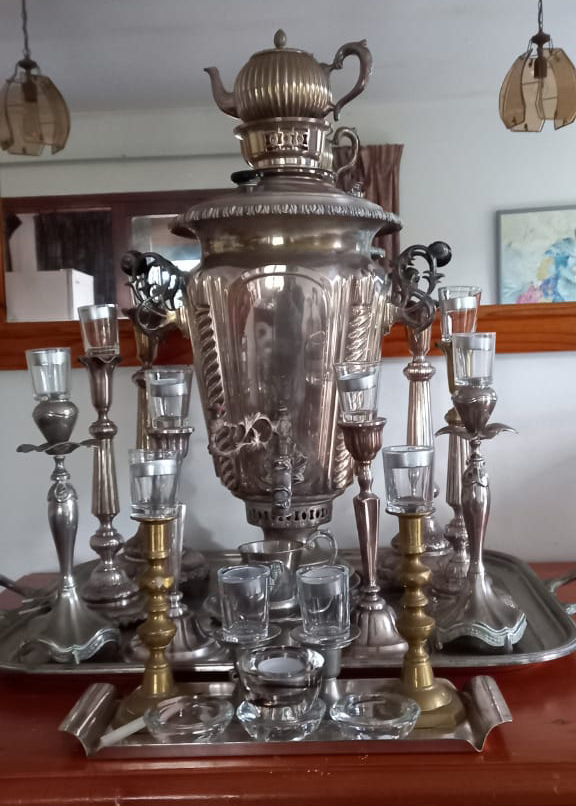Many Capetonians have childhood memories of visiting Bobba and Zaide and looking at the unusual ornaments in their home — items such as a beautiful metal spice box, ornate silver candlesticks, a decorative glass in a metal holder for drinking tea, and perhaps even a samovar.
Samovars were popular items in Eastern Europe and Russia during the 19th and early 20th centuries. And, while Bobba’s samovar was most likely just an antique on display, previous generations used these ‘kettles’ on a daily basis to boil water and make tea.
While items like these were treasured family heirlooms, in many cases in today’s world they don’t have the same attraction: homes are often smaller; the furnishing styles are more modern; and, in many instances, people have immigrated and so it becomes difficult to transport these items across the ocean.
It’s a dilemma that faced Cape Town resident, Sue Benatar. Knowing that she and her husband would have to downsize some time in the future, she had to make plans for the future of the family samovar.
A beautiful piece, the samovar also has quite a history. Sue explains: “When my Bobba, my father, aged 11 and his two younger brothers left Lithuania in 1939, just in time to escape the horrors of the Holocaust, they joined my Zaide who was already in Bulawayo, Rhodesia. While there was great relief at having been able to get out of Europe and survive in a safe environment, my grandmother always lamented the fact that she had to leave her beloved samovar behind.”
But, one year, on a holiday in Muizenberg, Sue’s granny saw a samovar that looked almost identical to the one left behind in Lithuania in a second-hand shop and decided to buy it, so restoring fond memories of this item. In later years, Sue inherited it and kept it in her home as a treasured possession.
And now, with a view to the future, Sue has donated it to the Lost Shtetl Museum currently being built in the town of Shadova (Šeduva) in Lithuania, the shtetl her grandmother grew up in. The new museum is the main goal of the Lost Shtetl Museum Project, and is expected to open in about a year’s time.
In mid-June, Sue handed the samovar over to the outgoing Ambassador of Lithuania in South Africa, Dainius Junevičius, for its return journey to Lithuania, where he will entrust it to Milda Jakulytė-Vasil, the Chief Curator of the Museum. “Although it was an emotional parting, I am happy that the samovar from Cape Town — via Bulawayo, Rhodesia — will proudly be on display as a memorial to the lost Jewish population of my family’s hometown,” Sue concludes.
Sue has written a children’s book that tells the story of the samovar, called The Samovar of Smiles. She is currently busy with the illustrations for the book and hopes to have it published before the end of this year.

• Published in the August 2023 issue – Click here to start reading.
• To advertise in the Cape Jewish Chronicle and on this website – kindly contact Lynette Roodt on 021 464 6736 or email advertising@ctjc.co.za. For more information and advertising rate card click here.
• Sign up for our newsletter and never miss another issue.
• Please support the Cape Jewish Chronicle with a voluntary Subscription for 2023. For payment info click here.
• Visit our Portal to the Jewish Community to see a list of all the Jewish organisations in Cape Town with links to their websites.
Follow the Cape Jewish Chronicle: Facebook | Instagram | Twitter | LinkedIn










